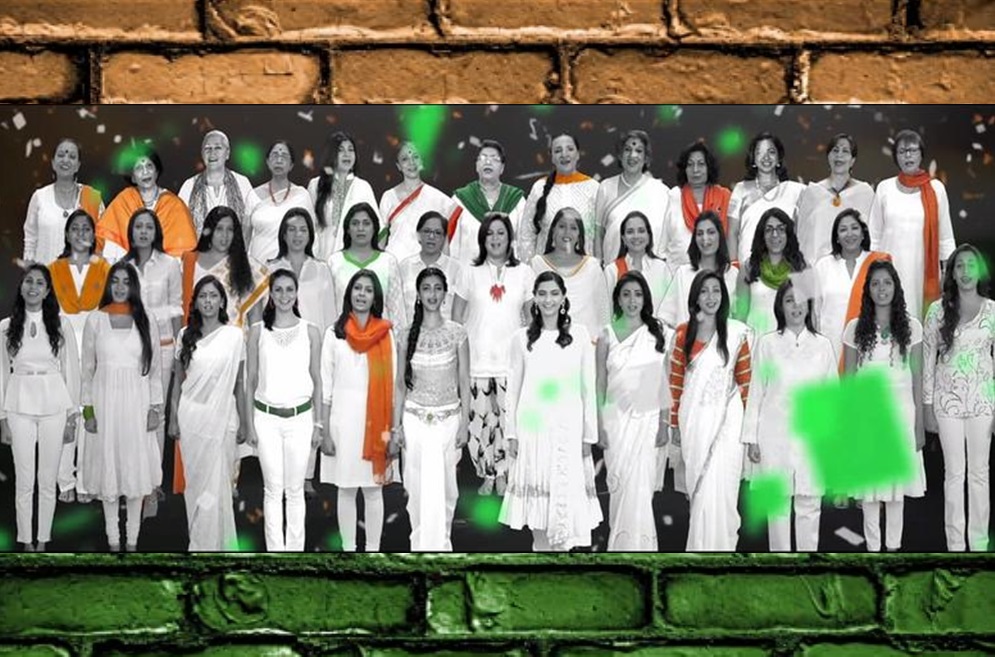AnalyticsBreaking NewsFeature Story
Not standing during National Anthem- Is it an offence? writes Ananda Debsharma

July 11: “Jana Gana Mana” is the National Anthem of India. Originally written in Bengali, it is the first of five stanzas of a poem written and later set to notation by Rabindranath Tagore. It was first sung in the Calcutta Session of the Indian National Congress on December 27, 1911. It was officially adopted by the Constituent Assembly as the Indian National Anthem on January 24, 1950.
 Is it legally compulsory to stand up for the national anthem or not ? Whether non-participation in the singing of National Anthem is an offence under Section 3 of the Prevention of Insults to National Honour Act, 1971 and whether the person who shows disrespect to the National Anthem can be booked under Section 3 of the Prevention of Insults to National Honour Act, 1971?
Is it legally compulsory to stand up for the national anthem or not ? Whether non-participation in the singing of National Anthem is an offence under Section 3 of the Prevention of Insults to National Honour Act, 1971 and whether the person who shows disrespect to the National Anthem can be booked under Section 3 of the Prevention of Insults to National Honour Act, 1971?
 What does the law say?
What does the law say?
Section 3 of the Prevention of Insults to National Honour Act, 1971 provides as follows:-
“3. Prevention of singing of Indian National Anthem, etc.—Whoever Intentionally prevents the singing of the Indian National Anthem or causes disturbance to any assembly engaged in such singing shall be punished with imprisonment for a term which may extend to three years, or with fine, or with both.”
From a bare reading of Section 3 above, it is crystal clear that intentional preventing of the singing of the Indian National Anthem or causing disturbance to any assembly engaged in such singing is made punishable with imprisonment up to three years, or with fine, or with both. Interestingly and indisputably, mere disrespect to Indian National Anthem is not an offence per se. It is only if the conduct of a person amounts to preventing the singing of Indian National Anthem or causing disturbance to any assembly engaged in such singing, it entails penal consequences in terms of Section 3 of the Act.
 Not standing up while the Indian National Anthem is being sung or standing up but not singing the National Anthem along with members of the assembly engaged in such singing may amount to disrespect to the National Anthem and a failure to adhere to a fundamental duties enumerated in Part IVA of the Constitution of India, but is not an offence as defined under Section 3 of the Act.
Not standing up while the Indian National Anthem is being sung or standing up but not singing the National Anthem along with members of the assembly engaged in such singing may amount to disrespect to the National Anthem and a failure to adhere to a fundamental duties enumerated in Part IVA of the Constitution of India, but is not an offence as defined under Section 3 of the Act.
 It may be relevant to note that at the time of promulgation of Constitution of India, there was a full dedicated Chapter on Fundamental Rights i.e. Part III in the Constitution of India, without any reference to correlative Fundamental Duties. It was only by way of the Constitution (Forty-Second Amendment) Act, 1976, that Part IVA pertaining to Fundamental Duties was introduced and various fundamental duties were enumerated in Article 51A. The first fundamental duty enumerated in Article 51A reads thus:-
It may be relevant to note that at the time of promulgation of Constitution of India, there was a full dedicated Chapter on Fundamental Rights i.e. Part III in the Constitution of India, without any reference to correlative Fundamental Duties. It was only by way of the Constitution (Forty-Second Amendment) Act, 1976, that Part IVA pertaining to Fundamental Duties was introduced and various fundamental duties were enumerated in Article 51A. The first fundamental duty enumerated in Article 51A reads thus:-
“to abide by the Constitution and respect its ideals and institutions, the National Flag and the National Anthem.”
It is thus evident, that the fundamental duties of the citizens towards the Nation were constitutionally recognized and made part of the solemn document i.e. the Constitution of India, that we the people of India have given to us. It is now the fundamental duty of every citizen, who claims fundamental and statutory rights from the State, to abide by the Constitution, respect its ideals and institutions, hold its National Flag and National Anthem in high esteem.
 Any infraction in this regard shall be treated as breach of fundamental duties which may dis-entitle a citizen to claim fundamental and other statutory rights. It needs no emphasis that though the fundamental duties like the directive principles are of great importance, one [Directive Principles] reminds the State of its obligations towards its citizens and other [Fundamental Duties] reminds its citizens about their duties towards Nation; yet like the Directive Principles of State Policy, the fundamental duties enumerated in Part IVA of the Constitution are also not enforceable in law nor the breach of such duties is an offence under any penal law of the State.
Any infraction in this regard shall be treated as breach of fundamental duties which may dis-entitle a citizen to claim fundamental and other statutory rights. It needs no emphasis that though the fundamental duties like the directive principles are of great importance, one [Directive Principles] reminds the State of its obligations towards its citizens and other [Fundamental Duties] reminds its citizens about their duties towards Nation; yet like the Directive Principles of State Policy, the fundamental duties enumerated in Part IVA of the Constitution are also not enforceable in law nor the breach of such duties is an offence under any penal law of the State.
 The Act makes insult to the Indian National Flag as an offence under Section 2 and also penalises the conduct of a person who either prevents singing of the National Anthem or causes any disturbance to any assembly engaged in such singing. This is so provided under Section 3, reproduced herein-above. It is, thus, concluded that though certain conduct of individuals, like not standing up while the National Anthem is being played or standing quiet in the assembly engaged in the singing of National Anthem may amount to showing disrespect to the National Anthem, but would not, per se, constitute an offence under Section 3 of the Act.
The Act makes insult to the Indian National Flag as an offence under Section 2 and also penalises the conduct of a person who either prevents singing of the National Anthem or causes any disturbance to any assembly engaged in such singing. This is so provided under Section 3, reproduced herein-above. It is, thus, concluded that though certain conduct of individuals, like not standing up while the National Anthem is being played or standing quiet in the assembly engaged in the singing of National Anthem may amount to showing disrespect to the National Anthem, but would not, per se, constitute an offence under Section 3 of the Act.
 At the cost of repetition, it is pointed out that only two type of conduct exhibited by a person or persons in relation to National Anthem is penalised under Section 3 of the Act. It is the conduct that prevents singing of the National Anthem or that causes disturbance in the assembly engaged in such singing that is declared as an offence under Section 3 of the Act and punishable with imprisonment for a term which may extend to three years, or with fine, or with both.
At the cost of repetition, it is pointed out that only two type of conduct exhibited by a person or persons in relation to National Anthem is penalised under Section 3 of the Act. It is the conduct that prevents singing of the National Anthem or that causes disturbance in the assembly engaged in such singing that is declared as an offence under Section 3 of the Act and punishable with imprisonment for a term which may extend to three years, or with fine, or with both.
 In November 2016, the Supreme Court passed a direction making it mandatory to play the National Anthem in cinema halls before the movie starts. A Division Bench of Justice Dipak Mishra and Justice Amitava Rao passed the order reasoning that, this is to instill a sense of nationalism and patriotism among the citizens. But in January 2018, a larger bench of three Judges of Supreme Court made playing of the National Anthem in cinema halls optional rather than mandatory. It is relevant to mention here that the Prevention of Insults to National Honour (Amendment) Bill, 2019, a private member bill was introduced by Parvesh Sahib Singh, M.P. in the Lok Sabha. The aforesaid bill was aimed at bringing within the purview of Section 3 of the Act intentional disrespect to the National Anthem. The Section 3, as proposed in the bill to substitute the existing Section 3 of the Act, reads thus:-
In November 2016, the Supreme Court passed a direction making it mandatory to play the National Anthem in cinema halls before the movie starts. A Division Bench of Justice Dipak Mishra and Justice Amitava Rao passed the order reasoning that, this is to instill a sense of nationalism and patriotism among the citizens. But in January 2018, a larger bench of three Judges of Supreme Court made playing of the National Anthem in cinema halls optional rather than mandatory. It is relevant to mention here that the Prevention of Insults to National Honour (Amendment) Bill, 2019, a private member bill was introduced by Parvesh Sahib Singh, M.P. in the Lok Sabha. The aforesaid bill was aimed at bringing within the purview of Section 3 of the Act intentional disrespect to the National Anthem. The Section 3, as proposed in the bill to substitute the existing Section 3 of the Act, reads thus:-
“Whoever intentionally prevents the singing of the Indian National Anthem or causes disturbance to any assembly engaged in such singing or intentionally causes disrespect to the National Anthem, shall be punished with imprisonment for a term, which may extend to three years, or with fine, or with both.
Explanation:–For the purposes of this section, the word “disrespect” shall include any person refusing to stand for or recite the National Anthem except when such person is suffering from any physical disability in that regard.”
 The reference to the bill aforesaid has been made only to emphasize the point that Section 3 of the Act, as it stands as on date does not make “disrespect” to the Indian National Anthem an offence unless it has the effect of preventing the signing of National Anthem or disturbing the assembly engaged in such signing. The conduct must amount to either preventing the signing of the National Anthem or causing disturbance in the assembly engaged in such singing so as to bring it within the purview of Section 3 of the Prevention of Insults to National Honour Act, 1971. But none of the provision dictates that it is mandatory to standup when national anthem is being played.
The reference to the bill aforesaid has been made only to emphasize the point that Section 3 of the Act, as it stands as on date does not make “disrespect” to the Indian National Anthem an offence unless it has the effect of preventing the signing of National Anthem or disturbing the assembly engaged in such signing. The conduct must amount to either preventing the signing of the National Anthem or causing disturbance in the assembly engaged in such singing so as to bring it within the purview of Section 3 of the Prevention of Insults to National Honour Act, 1971. But none of the provision dictates that it is mandatory to standup when national anthem is being played.
 The Jammu & Kashmir High Court has held on 9 July, 2021 (Dr. Tawseef Ahmed Bhat -versus- State of J & K & Another) that while not standing up for the National Anthem could be considered ‘disrespect’ to the anthem, it does not constitute an offence under the Prevention of Insults to National Honour Act, 1971. The High Court also quashed an FIR registered against a lecturer in Jammu province who was accused of not standing up for the National Anthem at a college function in 2018 to celebrate the first anniversary of the Indian Army’s ‘surgical strike’ on militant camps in Pakistan Occupied Kashmir (POK).
The Jammu & Kashmir High Court has held on 9 July, 2021 (Dr. Tawseef Ahmed Bhat -versus- State of J & K & Another) that while not standing up for the National Anthem could be considered ‘disrespect’ to the anthem, it does not constitute an offence under the Prevention of Insults to National Honour Act, 1971. The High Court also quashed an FIR registered against a lecturer in Jammu province who was accused of not standing up for the National Anthem at a college function in 2018 to celebrate the first anniversary of the Indian Army’s ‘surgical strike’ on militant camps in Pakistan Occupied Kashmir (POK).





